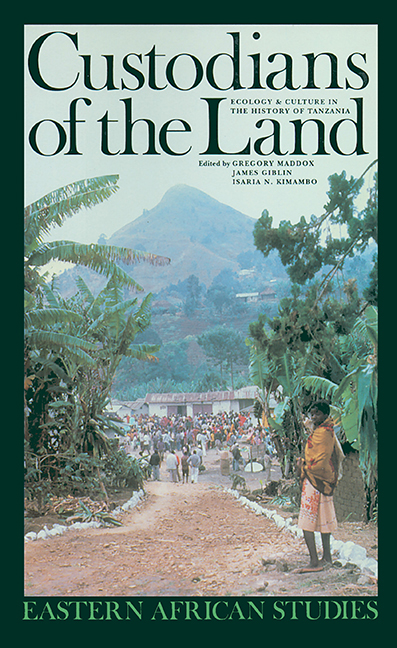Book contents
- Frontmatter
- Contents
- List of Maps, Figures & Tables
- List of Photographs
- Abbreviations
- Contributors
- Acknowledgements
- Introduction Custodians of the Land: Ecology & Culture in the History of Tanzania
- Part One Environmental & Demographic Change
- Part Two Environmental Change & Economic History: In Tanzania's Northern Highlands
- Part Three Politics & Environmental Change
- Part Four Environment & Morality
- Conclusion
- Bibliography
- Index
Conclusion
Published online by Cambridge University Press: 30 August 2017
- Frontmatter
- Contents
- List of Maps, Figures & Tables
- List of Photographs
- Abbreviations
- Contributors
- Acknowledgements
- Introduction Custodians of the Land: Ecology & Culture in the History of Tanzania
- Part One Environmental & Demographic Change
- Part Two Environmental Change & Economic History: In Tanzania's Northern Highlands
- Part Three Politics & Environmental Change
- Part Four Environment & Morality
- Conclusion
- Bibliography
- Index
Summary
The essays included in this volume have focused on the continuous interaction between humanity and the environment in the struggle for survival. This is timely for two reasons. First, as pointed out in the Introduction, historians of Tanzania have tended to avoid environmental concerns as part of their enquiry and analysis. To be sure, environmental discussions have appeared as background information to many studies, without featuring much in the main analysis. It is hoped that the case-studies in this volume have demonstrated the value of making environmental concerns a major part of analysis. Secondly, it is timely in the sense that the people of Tanzania now realize the importance of environmental concerns. In many ways communities face the consequences of the way their past activities have degraded their environments, and they have begun to search for remedies. Tree planting, for example, has become a common community activity in many parts of the country as people search for ways to restore soil fertility and increase supplies of fuel. Certainly, an analysis of past human activities will indicate that, in their interaction with the environment, people have continuously affected it, while at the same time changing their own ways of life. It is through such struggles that human beings have been able to make progress.
As long as human societies continue to act in their environments, there will be no time when this process of adaptation can cease. Even in the so-called developed world (where progress in development has been acknowledged), environmental issues continue to worry communities as the negative impact of human activities increases. The fact is that adaptation and control of environment are concerns of all human communities. The problem for historians comes when considering rural communities of less developed countries like Tanzania. The tendency here has been to assume that people in such societies depended more on nature and did little to shape it.
James C. McCann tells us that this situation has arisen because historians have focused on agriculture as a sub-field of political economy [rather] than as an agenda for the study of field systems, technology and cropping patterns'. By focusing on communities and their environments, the essays in this volume have redressed this imbalance to an extent. But, as we shall see in this chapter, environmental concern does not mean brushing aside the political picture.
- Type
- Chapter
- Information
- Custodians of the LandEcology and Culture in the History of Tanzania, pp. 241 - 254Publisher: Boydell & BrewerPrint publication year: 1996



